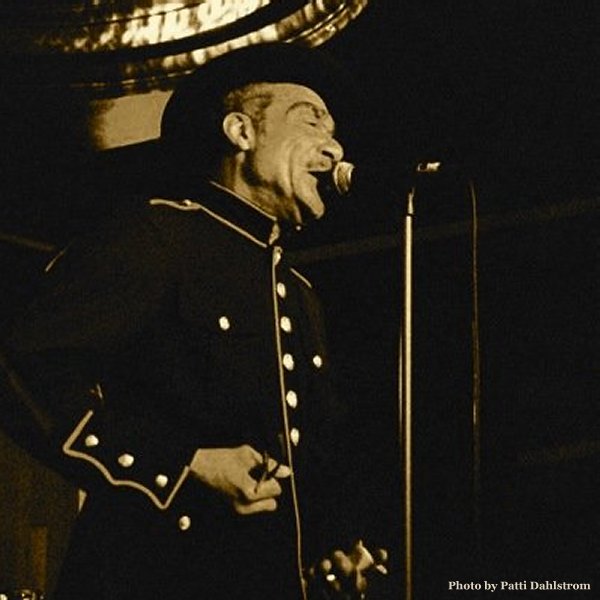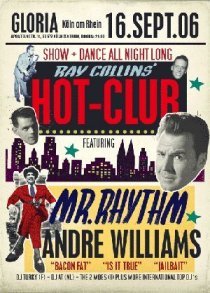

|
It's been a long hard road for Andre Williams, losing his mother at six then bouncing from aunts to his father and back, and as he says, "Raising myself." This winding bumpy road led Dre from Hank Williams playing on a truck radio in the sharecropping fields of Alabama through underage enlistment in the armed services trying to escape his home life to a year in prison when he was found out, and finally into the arms of the music business. Sometimes those arms were loving; sometimes not, but it has been a road that Andre still chooses to travel. Andre has graces he learned as a boy in Chicago that still serve him well. He was never bitter about the pre-Civil Rights treatment he received, as he says, "That's just the way it was." Traveling in his early music days he composed the song "Bacon Fat" driving down the highway eating a bacon and egg sandwich! It was all a bootleg business then with Devora Brown, a Memphis Jewish woman who was recording in the back of her store on old RCA microphones. Everyone was paid in cash, $10, and everyone was happy. No royalties existed, but Andre was making records. He speaks openly about his addiction problems in interviews and said his never having much money probably saved his life, as he couldn't afford the drug overindulgence he was attracted to. When Mick Patrick of Spectropop contacted me about interviewing Mr. Williams, as Dre and I had both been Motown writers, albeit in different decades, I was eager to meet and speak with him. He was coming to London to perform at The Luminaire, a club in Kilburn, not far from my new home In St. John's Wood. I arranged for the interview via Andre's MySpace page. Ah, the Internet, the connecter of all living things! I simply asked him if we could meet for a piece in Spectropop, and his reply was, "Sure, c'mon down baby, we'll talk." I arrived at 4:00, the appointed hour, and waited until 6:00, as Andre was sleeping. The road is hard on young men, so I don't even want to think about it at 72. Antoine, the lovely young French road manager, graciously checked on me every half hour to make sure I was fine with the delay. In the meantime, as I waited at The Kilburn Pub, others showed up to speak with Dre. The BBC and a music publication sat at another table. When Antoine came to escort me across the street to the hotel bar for the interview, I remarked that I was surprised I had been chosen before the bigger writers waiting in the pub. "You came first; you go first." He smiled, and I thought what a very savvy, young man. I stood in the elegant wood paneled space with high ornately coppered ceilings and watched for Andre's entrance. I had selected a quiet place in the corner and asked the bartender if she could lower the music while he was being interviewed. In walked Antoine with Andre. He is a very dapper man, elegantly dressed and coifed, tall (if bent) and thin. He is wearing a military style navy jacket with red piping and brass buttons, and it sets him off splendidly. I approached smiling and extended my hand, "Hello, Andre, I'm Patti Dahlstrom." He took my hand, slowly raised it, and gave it a gentile kiss. I was impressed by his gracious beginning, and surprised by his dignity. We moved to the table I had set up. I mentioned that I had been a Motown writer too, and he responded openly, and seemed immediately more comfortable in my presence and with the interview. |
|
|
||||||||||||||||||||
|
I returned to The Kilburn and met up with Mick Patrick. Spectropoppers and some folks from Ace Records were going to be joining us for the show. The opening act was The Flash Express, a hard rock group based out of Hollywood. Earlier in the day I met these gentlemen, and they were incredibly kind and helpful to me, making sure I got where I needed to be and had what I needed to have. Brian is the lead singer and guitar player of the trio, and has worked with Andre for ten years. As Andre told me, "If there wouldn't be no Brian, there wouldn't be no Andre. Now that's the truth." By the time Andre came on at 10:00 everyone in the sold out venue was ready for him. The crowd literally went wild. A young buxom blonde was pressed against the stage making eyes at this septuagenarian, along with the dancing girl stage right. It was R&B set to rock. I could hardly hear him and told the promoter who adjusted the mix to let Andre shine. He had missed the sound check, but after a few numbers all was kosher. The best pieces to me were the ones when the band cooled down and let Andre lead. His interpretation of "Put It In" with Brian's complimentary guitar licks was priceless. The audience was rapt. None of his earlier struggling for memories was apparent; Dre was in his element. He was a star. By the time he got to "Bacon Fat", it was a done deal. He was adored, and the three encore numbers brought the house down. I was amazed backstage at all these young beautiful girls throwing themselves at him. I asked him if he'd noticed the especially well-endowed blonde flirting with him throughout the show, and in his gracious way, he said, "I don't go there. I have never been with a woman that I did not really care about." When Mick and I walked with Antoine and Andre back to his hotel bar, we had a few more moments to talk with him. It had been a long day, an intense performance, and it showed on him. His history of trails off the primary path, and indulgences there, has robbed him of valuable tales and possible current creations. Still Andre Williams is a gentle man and a gentleman. I am so glad our paths crossed and from Mick and me and all at Spectropop, we wish him only the best. |
|
DRE @ MYSPACE: DRE @ PRAVDA: DRE ON CD: FLASH EXPRESS: |
|
PRESENTED BY THE SPECTROPOP TEAM |







